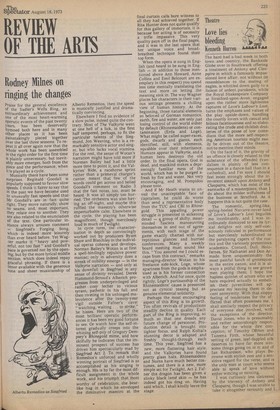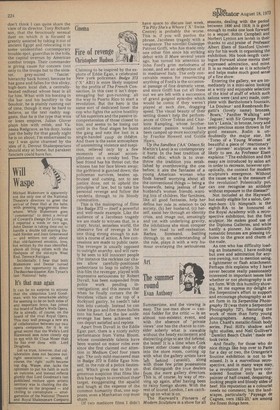Theatre Uwe lies .
bleeding Kenneth Hurren AAialras
The bard had a bad week in both town and country, the Bankside Globe over in Southwark offering a treatment of Antony and Cleopatra in which a famously impassioned love affair, not without its resemblances to the mating of eagles, is whittled down gaily to a liaison of ardent parakeets, while the Royal Shakespeare Company at Stratford-upon-Avon, engaged upon the rather more lightsome raptures of Love's Labour's Lost, turns the emphases and values of the play upside-down, handling the courtly lovers with casual and bilious facetiousness and so elaborating the crude and childish drolleries of the posse of low comedians that the more self-respecting American tourists might easily be driven out of the theatre, not to mention their minds.
On the face of it, the gravity of an offence is closely related to the substance of the offended (vandalism is plainly of less consequence in a dance-hall than in a cathedral), and I'm sure I should feel more strongly about the irreverent assault upon Antony and Cleopatra, which has most of the earmarks of a masterpiece, than I do about the milder wilfulness of the business at Stratford. As it happens this is not quite the case.
The romantic, spring-like, spring-heeled Navarre-never-land of Love's Labour's Lost beguiles me inordinately, and I was inordinately dismayed to see its lyrical delights not only self-consciously ridiculed in performance but mercilessly subordinated to the paralysing capers of the rustics and the variously pretentious academics. Costarci, Dull, Holofernes, Sir Nathaniel and Don Armado form unquestionably the most painful batch of grotesques in the entire canon, and it is always a pitiful thing to see grown men playing them; I hope the hapless quintet of actors who are here required actually to embellish their juvenilities will appreciate my leaving them in decent anonymity. With that sloppy feeling of tenderness for the afflicted that often possesses me, I shall similarly respect the privacy of everyone else involved, with the exceptions of the director, David Jones, who is presumably and rather astonishingly respon sible for the whole dire conception; of Timothy °Brien and Tazeena Firth, whose beautiful setting of green, leaf-dappled silk deserves to have far more win some things going on in it; and of Ian Richardson, who plays Berowne with stylish zest and a sen sitive regard for the verse, and is the only man at court who seems able to speak of love without either wincing or mincing.
I was curiously less distressed by the travesty of Antony and '2 Cleopatra, though I was unable to take it altogether seriously and I don't think I can quite share the view of its director, Tony Richardson, that the ferociously sensual duet on which it is focused is greatly assisted by taking it out of ancient Egypt and relocating it in some unidentified contemporary trouble-spot, guerrillas in the hills, the capital overrun by American combat troops. Their commander is giving cause for concern (not only to the troops but to the sinis ter, grey-suited ' fascist ' hierarchy back home), because he has gone and fallen for this slinky, high-born local dish, a centrallyheated redhead whose heat is all for him. What with his boozing in the bar and his banditry in the boudoir, he is plainly running out of time, though it may be hard to believe, as the text rashly suggests, that he is the type that wins or loses empires. Julian Glover plays him with relish, and Vanessa Redgrave, as his doxy, looks just the baby for that gaudy night he is on about; I'm embarrassed to say 1 was quite charmed by the idea of it. Devout Shakespearians -'should stay at home, but parakeet fanciers could have fun.

































 Previous page
Previous page